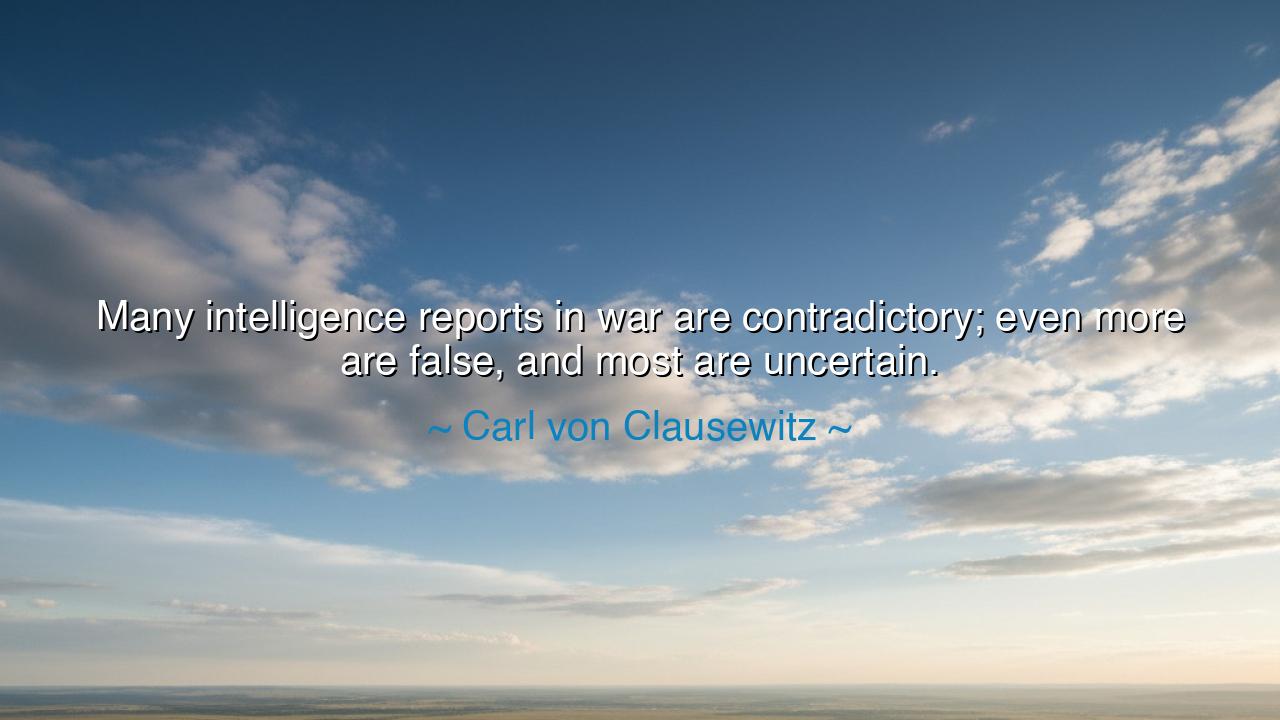
Many intelligence reports in war are contradictory; even more are
Many intelligence reports in war are contradictory; even more are false, and most are uncertain.






In this austere and piercing truth, Carl von Clausewitz, the philosopher of war, reveals the eternal fog that hangs over the battlefield of both conflict and life: “Many intelligence reports in war are contradictory; even more are false, and most are uncertain.” These words, carved from the hard stone of experience, speak not only to generals and soldiers, but to all who must make choices amid chaos and doubt. For Clausewitz, who lived and fought through the tumult of the Napoleonic wars, knew that certainty is a luxury of peace, while in war — and indeed, in all moments of struggle — men must act with courage, not because they know all, but because they know enough. His voice rises like that of an ancient oracle, reminding us that wisdom is not the absence of uncertainty, but the ability to move forward despite it.
The origin of this quote lies within his monumental work, On War (Vom Kriege), written in the early nineteenth century — a book not of tactics, but of philosophy. Clausewitz sought to pierce the illusions that cloud the minds of commanders and reveal war as it truly is: a realm of friction, chance, and imperfect knowledge. He understood that in the storm of battle, truth is always partial. Reports from scouts contradict one another; rumors spread like wildfire; fear distorts judgment. The commander stands like a sailor in fog, steering by instinct and fragmentary signs. His insight was born not from theory, but from the brutal clarity of experience — from seeing how overconfidence in false intelligence leads armies to ruin.
To say that “many intelligence reports are contradictory” is to speak to the nature of human perception itself. In war, as in life, men do not see the world as it is, but as they fear or hope it to be. Each report reflects the bias of the observer — his fear, his loyalty, his confusion. Some lie deliberately, others deceive themselves. And thus, truth becomes like a thread tangled in a thousand knots. The wise leader does not despair at this, but learns to listen between the contradictions, to weigh what is said against what is seen, and to trust not in certainty but in judgment. For in uncertain times, the mind itself must become the compass.
History offers countless examples of this lesson. In the year 1944, as the Allies prepared to land in Normandy, they launched Operation Fortitude, a vast deception campaign. False reports, fake armies, and phantom radio transmissions misled the German high command into believing the invasion would come at Calais, not Normandy. The intelligence reports that reached Hitler and his generals were detailed and convincing — yet they were false, crafted to exploit their expectations. Even as the invasion unfolded, they refused to believe the truth. Thus, the war was shaped not by who had more information, but by who discerned truth from illusion. Clausewitz, had he lived to see it, would have nodded knowingly: in war, the greatest danger is not ignorance, but misplaced certainty.
The power of this quote extends beyond the battlefield. Every soul that strives in the world encounters the fog of uncertainty — in business, in leadership, in love, in faith. Reports, opinions, and emotions surround us, often in contradiction. Some voices tell us to advance, others to retreat. Some truths shimmer, others deceive. The lesson of Clausewitz is not that knowledge is useless, but that perfect knowledge is impossible. To live is to act amid uncertainty, to choose without guarantee, to trust reason and courage when clarity is denied.
The ancient generals understood this, too. Sun Tzu, in The Art of War, wrote that “all warfare is based on deception.” Both he and Clausewitz, though centuries apart, understood that the first victim of conflict is always truth. Yet where Sun Tzu saw advantage in confusion, Clausewitz saw peril — a test of character. He believed that the greatest leaders are those who can see through the haze, not by magic or luck, but by strength of will and clarity of thought. “In the greatest uncertainty,” he wrote elsewhere, “the firmness of the spirit distinguishes the great from the small.” Thus, intelligence may fail, but wisdom endures.
So, my child, remember this when you walk through the storms of your own life: do not wait for certainty before you act. The reports will always be conflicting. The facts will always be incomplete. The voices will always argue. But within you lies the one thing the fog cannot obscure — the light of reason, the courage of conviction. Gather what truth you can, test it with your mind, and then move forward. For hesitation in uncertainty is as deadly in life as it is in war.
For as Carl von Clausewitz teaches, truth in times of conflict is rarely pure, and never simple. Yet those who learn to discern, to decide, and to endure amid confusion — they are the ones who prevail. The wise do not curse the fog; they navigate it. And in that act of steady motion, they transform uncertainty itself into the crucible of greatness.






AAdministratorAdministrator
Welcome, honored guests. Please leave a comment, we will respond soon